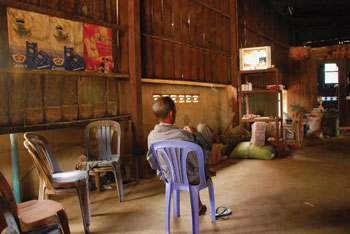KAMPONG THOM PROVINCE–IN the cafes of Stoung district, yesterday’s verdict in the case of Kaing Guek Eev, alias Duch, proved a hard sell. At one cavernous establishment on National Road 6, a broadcast of the proceedings vied for attention with a cheaply made Chinese action film.

- A man watches the proceedings yesterday at a roadside cafe in Stoung district. (Photo: Sebastian Strangio)
As soon as the music swelled and the credits began to roll, the mostly young crowd thinned, leaving a handful of elderly patrons to watch the Khmer Rouge tribunal on a second small screen in the back. And by the time the wiry Tuol Sleng commandant stood to attention and the verdict was read out, the room was empty save for two waitresses, who ferried away empty plates and glasses.
Interest was greater, though, in nearby Chaoyot village, especially among those who knew the prison chief when he was a schoolboy. Although most village elders did not watch the verdict – choosing instead to attend ceremonies marking Buddhist lent at Svay Romeat pagoda, where Duch studied as a child – the outcome provoked spirited discussion. Among one group of old women, dressed in flowing black gowns and white blouses, reactions to the verdict ranged from cold anger to forgiveness to pity for the convicted jailer.
Hi Hor, 72, who has lived in Duch’s village since she was born, said she was livid at the length of the sentence, which she said did not match the crimes he committed. “I will kill him and eat his meat if I meet him,” she said as she sat on a woven mat in the pagoda’s flag-draped dining hall. “The court should have sentenced him to his whole life in prison.”
At Kdey Doeum pagoda, located close to Chaoyot, village elders also gathered to mark the three-month lenten period, sitting on the floor of a half-constructed dining hall on the temple grounds. Pich Doeun, a 73-year-old layman, described his own experience under Democratic Kampuchea, when he was sent to a remote part of Stoung district to toil in communal rice paddies and construct irrigation dams. When asked if the verdict against Duch was fair, Pich Doeun expressed ambivalence. On one hand, 30 years was a just sentence, he said, but part of him wanted to see Duch executed and cremated, his bones placed in a stupa and never again removed. “I survived until today because of fate,” he said. “From my point of view, the court should kill him and bring his bones back and lock them up.”
Others, however, were able to separate their anger with the Khmer Rouge from their positive memories of the young Duch. “Even though I was tortured and did not get enough food to eat during that time, I pardon him. Everything passed over 30 years ago,” said 71-year-old Chhum Oeun, sitting at Svay Romeat pagoda.
Despite the evidence presented against him at trial, she said she would always remember Duch as “good and intelligent”, not the cruel ideologue convicted of overseeing the deaths of as many as 16,000 people at Tuol Sleng. Some of Duch’s relatives, too, said they did not view Duch as a monster, and condemned the court for a sentence they said was too strict. “I really pity my nephew,” said one 71-year-old who claimed to be Duch’s aunt, and who gave her name only as Tob. “The court should have charged him for a shorter time because he is too old, and let him live together with his family in his old age. “I don’t know what happened to him to make him become a Khmer Rouge during that time because his parents were good people,” she added.
A few hundred metres down the muddy village road, Brak Chlam, 67, one of Duch’s cousins, said he hoped to see the prison chief again. “I don’t care about the court charging him. What I care about is his life – I want to see him survive,” he said. Brak Chlam said he planned to visit Duch in prison if he could find the money. “I always see his face on TV. I want to see his real face,” he said. “I was so happy when I got news that he survived, because I wanted him to survive. I don’t know what he did in Phnom Penh. I only know that he was a good and intelligent boy.”
While the verdict divided opinion among those old enough to have detailed memories of the regime, younger observers seemed more or less indifferent to the verdict handed down yesterday. At another roadside cafe, the patrons were focused instead on playing chequers and watching kickboxing. Meas Rith, 41, who sat among a group of men watching the fight, said he had not been following the tribunal closely, but that he did not think it fair that Duch could potentially die in prison.
“The court should have sentenced him to about 10 years to give him some chance to spend time in the pagoda in his old age,” he said, before turning his attention back to the television. A cry went up as the two combatants pummelled each other onscreen.
“The people in the rural areas are not as interested about what has happened in the past as people in the city,” said Chai Lign, the owner of the café. The sinewy 29-year-old said he had heard of Duch but knew little of life under the Khmer Rouge, and that many his age were the same way. “They don’t want to know about the pain,” he said. “Some people don’t even know Duch’s face, what he looks like.” WITH REPORTING BY MAY TITTHARA
[Published in the Phnom Penh Post, July 27, 2010]



